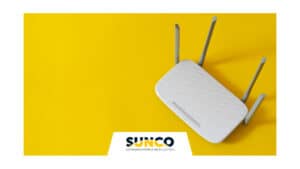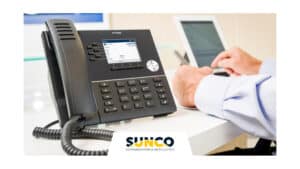Businesses now have a wide range of phone systems, even among VoIP services. However, regardless of the design or system, expenses will play a significant role, with business owners asking, “How much does a VoIP phone system cost?”
In this article, we will explain what goes into a complete business phone system to give you an idea of how costing works. Additionally, we will list some solutions and offers to help you get started with your VoIP phone service.
Setting Up a VoIP Phone System
Voice over Internet Protocol (VoIP) refers to transmitting telephone connections using your connection to the internet. By combining traditional telephony solutions with digital communications services, businesses achieve unified communications that streamline services and accelerate growth.
Modern VoIP phone services vary in price depending on the setup. You can either opt for a hosted or on-premise solution, as explained in detail below:
On-Cloud VoIP
Also known as “hosted VoIP” or “hosted PBX,” on-cloud VoIP refers to a system where the provider hosts entire VoIP phone systems. Depending on the agreement, it can include the hardware, the network, and the software necessary. You only need to define the number of devices needed and what business needs to be met.
- The advantages of a hosted PBX include the following:
- No maintenance work and fees from your end
- Low upfront costs
- Quick deployment
| There’s a surprising amount that goes into business communications. Learn about the basics on our blog: |
- No additional office space required
- Easily scalable for changing needs
On-Premise VoIP
On-site PBX systems are the traditional setup for VoIP systems. You purchase the equipment and set up the infrastructure at your place of business. While it has a much higher upfront cost, it is robust and resistant to price changes. You can also isolate your organization’s IT infrastructure for cybersecurity purposes.
Some advantages of on-premise PBX systems include:
- Full control over network configurations
- One-time expenditure for setting up a VoIP system
- Stable costs despite changing device needs
VoIP Business Phone System Costs
Assuming you already have an IT infrastructure, the main addition will be the VoIP phone systems. You can invest in any of the three options:
1. VoIP Phones
Generally the most costly of the three options, VoIP phones are distinguished by their additional buttons for extra functions. Modern models even use touchscreens for performing additional online tasks. The wide selection of VoIP phones can come as traditional desk phones or wireless models. The VoIP phone costs vary depending on the provider and model.
2. VoIP Adapter
A VoIP adapter lets you keep your old hardware and move your phone lines into a virtual PBX system, making it perfect for legacy systems. While it helps keep your old handsets, you are missing out on the powerful features offered by full IP phones. Its best application, however, is to use it as a temporary measure as you prepare for a full business phone system upgrade.
3. Softphones
Softphones are essentially software that emulate traditional landline phones. These are apps you can easily install on any device that perform tasks just as you would with a standard telephone.
Of course, purchasing a new device entails the most considerable cost of the three. But remember that certain providers are willing to include equipment in a subscription plan. This arrangement opens up the possibility of using a VoIP phone for your organization without incurring heavy upfront costs, making them ideal communication solutions for small business owners.

Credits: Yan Krukov
Cost of VoIP Calls
Depending on the provider, you will generally choose between a fixed monthly rental fee and a usage-based cost. In the first option, you subscribe to a plan that is billed monthly per user. It covers the rent for the equipment and service lines. In some cases, this includes unlimited calls for the registered subscribers.
On the other hand, your VoIP for business plan can be charged based on your usage. It can vary depending on the bandwidth your network consumes or can be billed based on your outbound calls. While it can be a cost-effective option, it can spiral out of control if you make regular outbound calls.
Still, either plan costs less compared to traditional phone calls. According to a recent survey, you can expect the following savings with VoIP phone service:
- Up to 90% on international calls
- Up to 75% on operational costs—a big help for a small business owner.
- About 40% on local calls
- Up to 30% on overall phone bills
What to Look For in a VoIP Phone System
How much does a VoIP phone system cost? To better understand this, it helps to identify key services and how they can serve your business. In doing so, you can better justify the service costs that it will entail.
Keep in mind that while you don’t need the most advanced features out there, you can build your value analysis against the cost of a VoIP system with these five basic features:
1. Call Routing
For a growing business, increasing clientele can mean multiple phone calls. Call management features are a must to ensure that you attend to them without leaving them feeling neglected.
Call queuing helps you distribute incoming calls across your team, reducing wait times. In call centers, a key metric is the call abandonment rate, or the percentage of customers who hang up before completing what is expected of them. Call centers usually experience abandonment rates between 5% and 8%, and the right VoIP queuing tool can help you drive that down.
Ready to Get Started with VoIP?Sunco will design and build your VoIP phone system and provide 24/7 support |
Aside from automated queuing, you can also route calls automatically. You can even use bots in the form of intelligent voice response (IVR) menus or deploy an auto-attendant to answer calls beyond business hours.
2. Call Recording
Call recording is an underrated yet essential feature for business and potentially legal purposes. Recording your customer calls is becoming an industry standard. For example, Phonesuite phone systems for hotels include this feature for tracking down guest requests or reviewing on-site services.
3. Phonebook Management
By integrating telephony with data and internet-based platforms, you gain access to a host of additional features—keeping your contacts organized among them. It is now easier to conduct number porting or add and manage your contacts in a built-in phone book app with the platform.
4. Voice-to-Text (VTT)
Voice-to-text leverages artificial intelligence and speech recognition, among others, to convert audio messages into text. This is particularly important for business applications that require a written transcript of a conversation.
5. Cross-Platform Integration
One advantage of VoIP systems is that you can use a variety of devices to respond to calls. It allows you to multitask or even join video conferencing calls without having to leave your table. While this is commonly associated with softphones, modern VoIP sets also allow forwarding calls to other devices.
Keep Your VoIP Costs Under Control
With the right preparation, you can keep your VoIP expenses predictable and under control. Although there is no one-size-fits-all solution to finding a unified communications system, you can coordinate with a reliable service provider and only pay for the devices and services that add value to your day-to-day operations.
It is understandable that business owners fear cost creep once their VoIP projects are underway, and a systems integration expert like Sunco can help allay those fears.
As a leading one of Canada’s VoIP providers, our no-obligation bill audit practices ensure that you’re not overcharged and that nothing goes past your budget plans. Contact Sunco today and learn more about keeping your VoIP costs under control.
Featured Image Credit: Andrea Piacquadio




